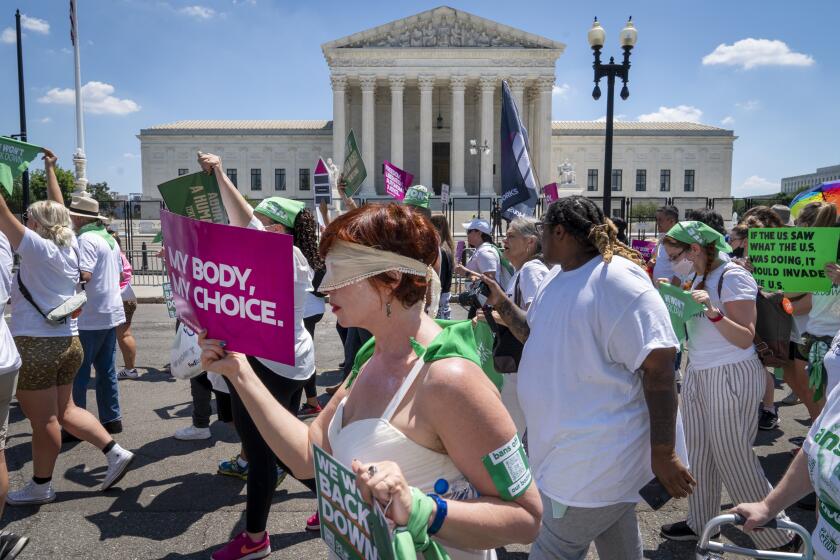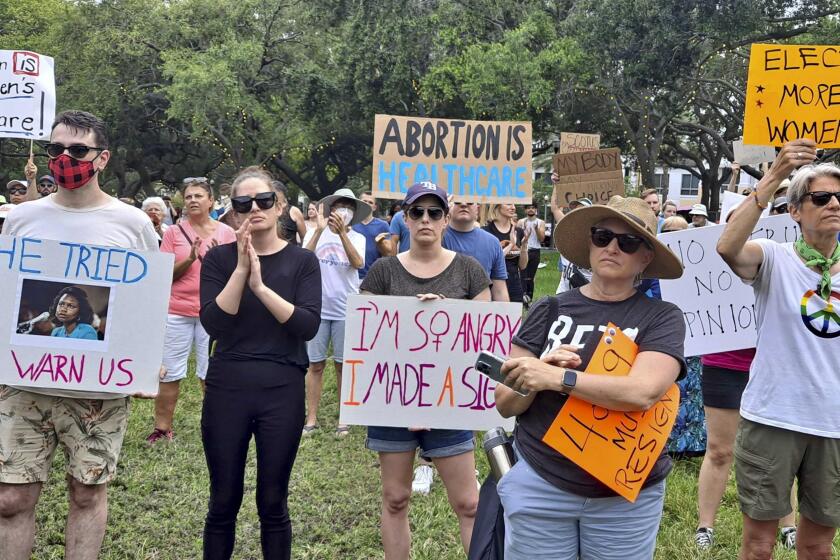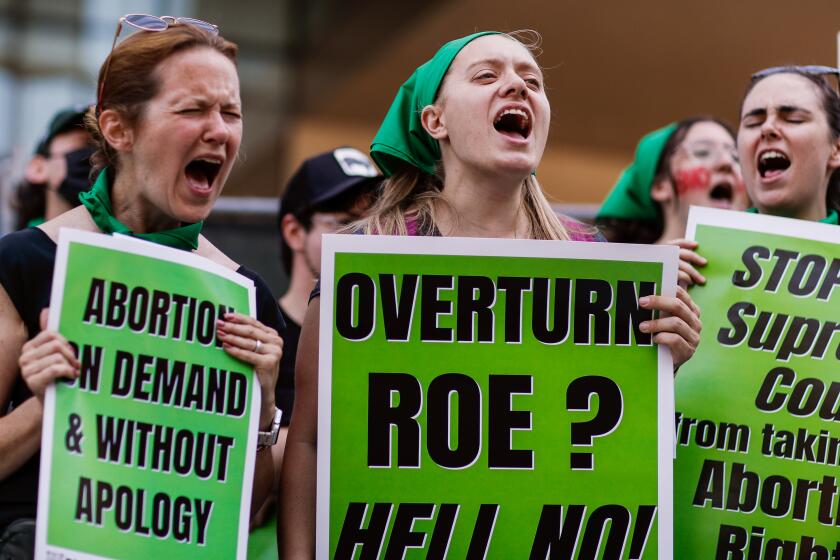Texas clinics halt abortions after state high court ruling

- Share via
AUSTIN, Texas — Clinics were shutting down abortion services in the nation’s second-largest state Saturday after the Texas Supreme Court blocked an order that had briefly allowed the procedure to resume in some cases, the latest in legal scrambles taking place across the U.S. following the reversal of Roe vs. Wade.
The Friday night ruling stopped a three-day-old order by a Houston judge who said clinics could resume abortions for patients up to six weeks into a pregnancy. The following day, the American Civil Liberties Union said it doubted that any abortions were now being provided in a state of nearly 30 million people.
Amy Hagstrom Miller, president of Whole Woman’s Health, said the ruling forced an end to abortions in her group’s four Texas clinics, and workers there were winding down abortion operations and having “heartbreaking conversations” with women whose appointments were canceled.
“I ache for us and for the people we have dedicated our lives to serve with the fabulous abortion care we provide, many who will be denied that right in the months and possibly years to come,” Hagstrom Miller said in a statement.
Planned Parenthood’s multiple affiliates in Texas had not resumed abortion services even after the restraining order was put in place Tuesday.
It was not immediately clear whether the clinics in Texas that resumed performing abortions just days ago would halt services again following the ruling.
At issue was a long-dormant 1925 criminal law that targets individuals who perform abortions. Clinics had argued that it was invalid after abortion became a constitutional right across the U.S. in 1973. The U.S. Supreme Court, however, struck down the landmark Roe decision on June 24, leaving abortion policy to states.
“Pro-life victory! ... Litigation continues, but I’ll keep winning for Texas’s unborn babies,” said Texas Atty. Gen. Ken Paxton, a Republican, who had asked the state Supreme Court to intervene.
Separately, Texas has a 2021 law that was designed to ban abortion in the event that Roe were overturned. It takes effect in the weeks ahead.
“Extremist politicians are on a crusade to force Texans into pregnancy and childbirth against their will, no matter how devastating the consequences,” said Julia Kaye of the ACLU.
Providers and patients across the country have been struggling to navigate the evolving legal landscape around abortion laws and access.
The fall of Roe vs. Wade has shifted the battleground over abortion to courthouses around the country, as abortion foes looked to quickly enact statewide bans and the other side sought to buy more time.
In Florida, a law banning abortions after 15 weeks went into effect Friday, the day after a judge called it a violation of the state constitution and said he would sign an order temporarily blocking it next week. The ban could have broader implications in the South, as Florida currently allows greater access to the procedure than neighboring states.
Even women who travel outside states with abortion bans to end their pregnancies may have fewer options to do so and even face prosecution in their home states.
Planned Parenthood of Montana this week stopped providing medication abortions to patients who live in states with bans.
A Florida judge says he will temporarily block a 15-week abortion ban, but his ruling won’t take effect before the law is enacted, creating confusion for patients and abortion providers. A Kentucky judge temporarily blocked that state’s near-total ban on abortions.
Planned Parenthood North Central States, which offers the procedure in Minnesota, Iowa and Nebraska, is telling patients that they must take both pills in the regimen while in a state that allows abortion.
The use of pills has been the most common method to end a pregnancy since 2000, when the U.S. Food and Drug Administration approved mifepristone, the main drug used in medication abortions. Taken with misoprostol, a drug that causes cramping that empties the womb, it constitutes the abortion pill.
Also Friday, Google, the company behind the internet’s dominant search engine and the Android software that powers most smartphones, said it would automatically purge information about users who visit abortion clinics or other places that could trigger potential legal problems.
Senate Constitutional Amendment 10 would, if approved by voters, further codify the state’s already progressive reproductive rights.
In addition to abortion clinics, Google cited counseling centers, fertility centers, addiction treatment facilities, weight loss clinics and cosmetic surgery clinics as destinations that would be erased from users’ location histories. Users have always had the option to edit their location histories on their own, but now Google will do it for them as an added level of protection, the company said.
“We’re committed to delivering robust privacy protections for people who use our products, and we will continue to look for new ways to strengthen and improve these protections,” Jen Fitzpatrick, a Google senior vice president, wrote in a blog post.
More to Read
Sign up for Essential California
The most important California stories and recommendations in your inbox every morning.
You may occasionally receive promotional content from the Los Angeles Times.














